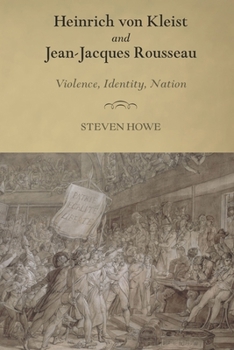Heinrich Von Kleist and Jean-Jacques Rousseau: Violence, Identity, Nation
(Part of the Studies in German Literature Linguistics and Culture Series)
By reconsidering Kleist's reception of Rousseau and placing it in historical context, this book sheds new light on a range of political and ethical issues at play in Kleist's work. Heinrich von Kleist is renowned as an author who posed a radical challenge to the orthodoxies of his age. Today, his works are frequently seen to relentlessly deconstruct the paradigms of Idealism and to reflect a Romantic, even postmodern, perspective on the ambiguities of the world. Such a view fails, however, to do full justice to the more complex manner in which Kleist articulates the tensions between the securities of Enlightenment thought and the anxieties of the revolutionary age.
Steven Howe offers a new angle on Kleist's dialogue with the Enlightenment by reconsidering his investment in the philosophy of Jean-Jacques Rousseau. Where previous critics have trivialized this as intense but fleeting and born of personal identification, Howe here establishes Rousseau's importance as a lasting source of inspiration for the violent constellations of Kleist's fiction. Taking account of both Rousseau'scritique of modernity and his later propositions for working toward the Enlightenment promise of emancipation, the book locates a mode of discourse which, placed in the historical context of the French Revolution and Napoleonic Wars, sheds new light on the political and ethical issues at play in Kleist's work. Steven Howe is Associate Research Fellow at the University of Exeter, UK. He is co-editor, with Ricarda Schmidt and Se?n Allan, of Heinrich von Kleist: Konstruktive und Destruktive Funktionen von Gewalt (forthcoming, 2012).
Steven Howe offers a new angle on Kleist's dialogue with the Enlightenment by reconsidering his investment in the philosophy of Jean-Jacques Rousseau. Where previous critics have trivialized this as intense but fleeting and born of personal identification, Howe here establishes Rousseau's importance as a lasting source of inspiration for the violent constellations of Kleist's fiction. Taking account of both Rousseau'scritique of modernity and his later propositions for working toward the Enlightenment promise of emancipation, the book locates a mode of discourse which, placed in the historical context of the French Revolution and Napoleonic Wars, sheds new light on the political and ethical issues at play in Kleist's work. Steven Howe is Associate Research Fellow at the University of Exeter, UK. He is co-editor, with Ricarda Schmidt and Se?n Allan, of Heinrich von Kleist: Konstruktive und Destruktive Funktionen von Gewalt (forthcoming, 2012).
Format:Hardcover
Language:English
ISBN:1571135545
ISBN13:9781571135544
Release Date:December 2012
Publisher:Camden House (NY)
Length:248 Pages
Weight:1.15 lbs.
Dimensions:0.9" x 6.0" x 9.3"
Customer Reviews
0 rating





